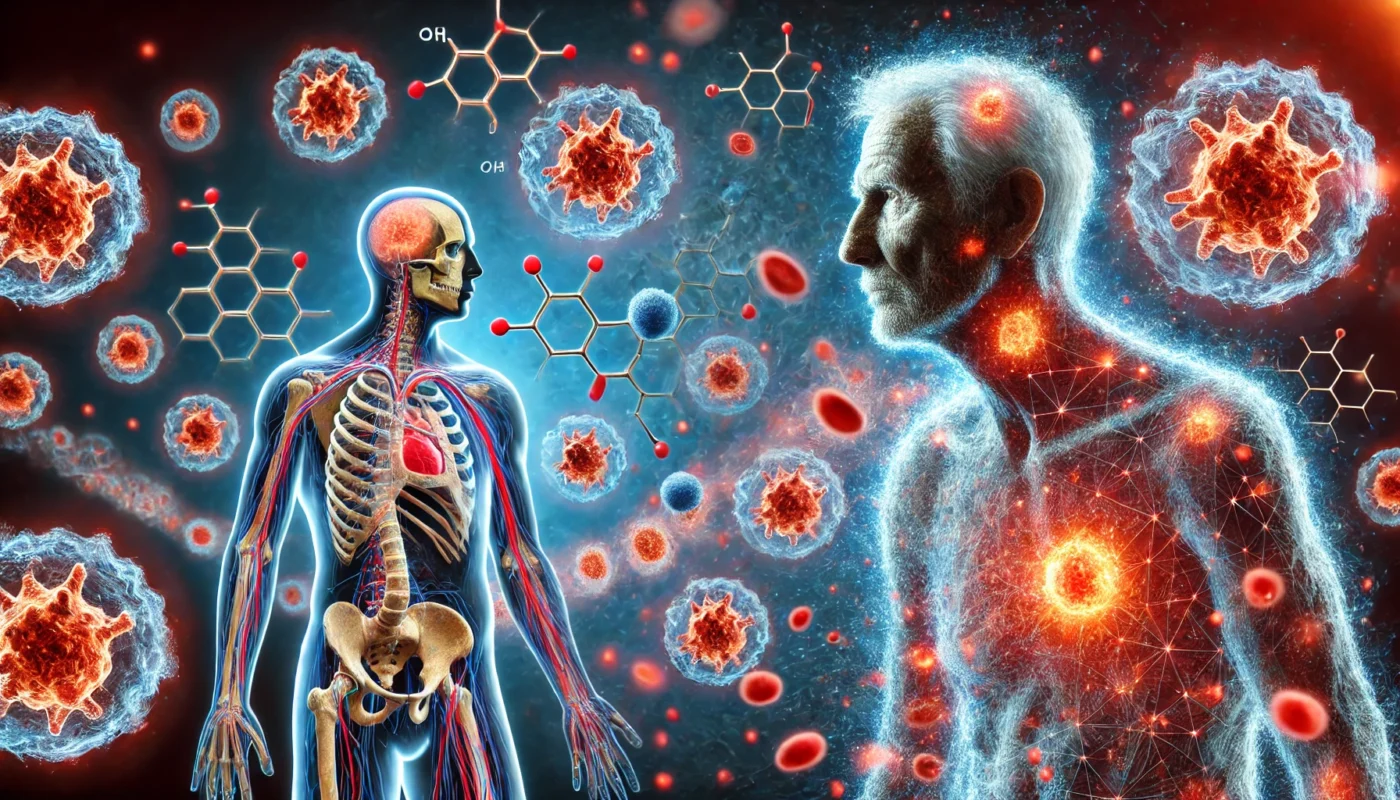The immune system’s journey through life is marked by distinct phases, each characterized by unique strengths and vulnerabilities. From the initial development in infancy to peak performance in young adulthood, and eventually to the gradual decline in later years, the immune system’s evolution is a testament to the body’s adaptability.
You May Also Like: Understanding Autoimmune Fatigue: Causes and Solutions
When Is Your Immune System the Strongest?
The immune system reaches its zenith during young adulthood, typically in your 20s and 30s. During this period, the thymus, an organ crucial for T-cell production, is most active. These T-cells are vital components of the adaptive immune system, enabling the body to mount a rapid and effective response to pathogens. This stage is marked by robust immune responses, efficient antibody production, and a lower susceptibility to infections.
Role of the Thymus in Immune Strength
The thymus plays a pivotal role in developing a strong immune system by producing T-cells, which are essential for adaptive immunity. In young adults, the thymus is at its most active, facilitating a rapid and effective response to pathogens. The organ’s high activity level allows for the efficient production of naïve T-cells, which can recognize and respond to new antigens.
Immunological Memory in Young Adults
During this peak phase, the immune system also benefits from a well-developed immunological memory, allowing it to recognize and respond more efficiently to previously encountered pathogens. This memory is crucial for quickly neutralizing threats and preventing illness. The presence of memory cells ensures that the immune response is faster and more effective upon subsequent exposures to the same pathogens.
Influence of Hormones on Immune Function
Hormonal changes in young adulthood can also influence immune function, with hormones such as estrogen and testosterone playing roles in modulating immune responses. These hormones can enhance the immune system’s ability to fight infections, although their effects may differ between genders. Understanding the interplay between hormones and immunity can help explain variations in immune strength among individuals.
Why Does the Immune System Weaken Over Time?
As we age, several factors contribute to the gradual decline of the immune system, a process known as immunosenescence. This decline is a natural part of aging and involves various changes at the cellular and systemic levels. The weakening of the immune system is a complex process influenced by both intrinsic and extrinsic factors.
Impact of Aging on Immune Cell Production
One of the key factors in immune decline is the reduced production of new immune cells. As we age, the body’s ability to generate new T-cells diminishes, leading to a decrease in the pool of naïve T-cells available to respond to new threats. This reduction in cell production limits the immune system’s ability to adapt to new challenges.
Changes in Immune Cell Function
In addition to reduced production, aging also affects the function of existing immune cells. Over time, immune cells may become less effective at recognizing and responding to pathogens. This decline in functionality can result in a slower and less coordinated immune response, increasing the risk of infections and diseases.
Systemic Changes in Immune Regulation
Aging can also lead to systemic changes in immune regulation, affecting the balance between pro-inflammatory and anti-inflammatory signals. These changes can disrupt the delicate equilibrium required for optimal immune function, contributing to the increased prevalence of chronic inflammatory conditions in older adults.
Thymic Involution
Thymic involution is one of the primary reasons for immune decline. The thymus begins to shrink after puberty, reducing its output of new T-cells. By middle age, the thymus is significantly less active, resulting in a diminished supply of naïve T-cells that can respond to new antigens. This reduction in thymic activity is a significant factor in the overall weakening of the immune system.
Physiological Changes in the Thymus
The thymus undergoes several physiological changes with age, including a decrease in size and a reduction in functional tissue. These changes lead to a decline in the organ’s ability to produce new T-cells, impacting the body’s capacity to respond to new infections. Understanding the mechanisms behind thymic involution can provide insights into potential interventions to slow its progression.
Consequences of Reduced T-cell Production
The reduction in T-cell production due to thymic involution has far-reaching consequences for immune function. With fewer naïve T-cells available, the body becomes less capable of mounting an effective response to novel antigens. This decreased immune adaptability increases the vulnerability to infections, particularly those caused by new or mutated pathogens.
Potential Interventions to Mitigate Thymic Involution
Research into potential interventions to slow or reverse thymic involution is ongoing. Strategies such as hormone therapy, dietary supplementation, and lifestyle modifications may help maintain thymic function and support T-cell production. While these interventions hold promise, further studies are needed to fully understand their efficacy and long-term effects.
Cellular Senescence
Over time, immune cells themselves undergo senescence, losing their ability to divide and function effectively. This senescence can lead to a reduced immune response, making it harder for the body to fight off infections and diseases. Cellular senescence is a critical factor in the age-related decline of immune function.
Mechanisms of Cellular Senescence
Cellular senescence is driven by various mechanisms, including DNA damage, oxidative stress, and telomere shortening. These factors contribute to the accumulation of senescent cells, which lose their ability to divide and perform essential immune functions. Understanding these mechanisms can aid in developing strategies to delay or reverse cellular senescence.
Impact on Immune Surveillance
The accumulation of senescent immune cells can impair immune surveillance, the process by which the immune system monitors and eliminates abnormal cells. This impairment can lead to an increased risk of cancer and other age-related diseases. Enhancing immune surveillance through targeted interventions may help mitigate these risks.
Strategies to Address Cellular Senescence
Potential strategies to address cellular senescence include the use of senolytic drugs, which selectively eliminate senescent cells, and lifestyle interventions that reduce oxidative stress. While these approaches show promise, further research is needed to determine their safety and effectiveness in humans.
Inflammation
Chronic, low-grade inflammation, often referred to as “inflammaging,” is another hallmark of aging. This persistent inflammatory state can interfere with normal immune function, contributing to the development of age-related diseases. Understanding the role of inflammation in immune decline is crucial for developing strategies to maintain immune health.
Causes of Inflammaging
Inflammaging is caused by a combination of factors, including the accumulation of senescent cells, increased production of pro-inflammatory cytokines, and changes in gut microbiota. These factors create a state of chronic inflammation that can disrupt normal immune function. Identifying the causes of inflammaging can guide the development of targeted interventions.
Consequences of Chronic Inflammation
Chronic inflammation can have several detrimental effects on the immune system, including reduced ability to respond to infections and increased susceptibility to autoimmune diseases. It can also contribute to the development of chronic diseases such as cardiovascular disease and diabetes. Addressing chronic inflammation is essential for maintaining overall health in older adults.
Approaches to Reduce Inflammation
Approaches to reduce inflammation include dietary modifications, regular exercise, and the use of anti-inflammatory supplements. These strategies can help modulate the immune response and reduce the impact of chronic inflammation on immune function. However, individual responses may vary, and personalized approaches may be necessary for optimal results.

Factors That Influence Immune Decline
Several factors influence the rate at which the immune system declines, including lifestyle choices, environmental exposures, and genetic predispositions. Understanding these factors can help individuals make informed decisions to support their immune health throughout life.
Lifestyle and Environmental Factors
Our lifestyle choices and environment play significant roles in influencing how quickly or slowly our immune systems age. Making positive changes in these areas can help mitigate immune decline and promote overall health.
Diet and Nutrition
Diet and nutrition are critical components of immune health. Nutritional deficiencies, particularly in vitamins and minerals like vitamin C, zinc, and vitamin D, can impair immune function. A balanced diet rich in fruits, vegetables, and whole grains provides essential nutrients that support immune health.
Role of Physical Activity
Regular, moderate exercise is known to boost immune function by improving circulation and promoting the movement of immune cells throughout the body. A sedentary lifestyle, on the other hand, can accelerate immune decline and increase the risk of chronic diseases.
Importance of Sleep Quality
Poor sleep quality can weaken immune responses, while adequate sleep supports the immune system’s ability to repair and regenerate. Establishing healthy sleep habits and ensuring sufficient rest are crucial for maintaining immune health.
Impact of Chronic Stress
Chronic stress has been shown to suppress immune function, making the body more susceptible to illness. Managing stress through techniques such as mindfulness, meditation, and relaxation exercises can help support a balanced immune response.
Genetic Factors
Genetic predispositions can also affect how the immune system ages. Some people may naturally have a more resilient immune system due to their genetic makeup, while others may be more prone to immunosenescence. Understanding these genetic influences can guide personalized approaches to immune health.
Inherited Immune Traits
Certain immune traits are inherited, affecting an individual’s baseline immune function and resilience to infections. These traits can influence the body’s ability to respond to pathogens and the overall rate of immune decline.
Genetic Variability in Immune Aging
Genetic variability plays a role in how different individuals experience immune aging. Some people may experience a more gradual decline in immune function, while others may face a more rapid deterioration. Identifying genetic markers associated with immune aging can provide insights into personalized interventions.
Role of Epigenetics in Immune Health
Epigenetic factors, such as DNA methylation and histone modification, can influence immune function and aging. These changes can affect gene expression and impact the immune system’s ability to adapt to environmental challenges. Exploring epigenetic interventions may offer new avenues for supporting immune health.

Strategies to Strengthen the Immune System
While the decline of the immune system is a natural part of aging, there are strategies that can help mitigate this process. By adopting a proactive approach, individuals can support their immune health and enhance their overall wellbeing.
Nutritional Support
A balanced diet rich in fruits, vegetables, whole grains, and lean proteins can provide essential nutrients that support immune health. Supplements such as vitamin D, omega-3 fatty acids, and probiotics may also offer additional benefits.
Importance of a Balanced Diet
A balanced diet provides the necessary vitamins, minerals, and antioxidants to support immune function. Consuming a variety of nutrient-dense foods ensures that the body receives the essential components needed for optimal immune health.
Role of Supplements in Immune Support
In addition to a balanced diet, certain supplements can provide targeted support for the immune system. Vitamin D, omega-3 fatty acids, and probiotics have been shown to enhance immune responses and reduce inflammation.
Benefits of Antioxidant-Rich Foods
Foods rich in antioxidants, such as berries, nuts, and leafy greens, can help protect immune cells from oxidative stress. Antioxidants neutralize free radicals, reducing damage to immune cells and supporting overall immune health.
Regular Exercise
Engaging in regular physical activity can enhance immune function. Exercise improves circulation, which allows immune cells to move more freely throughout the body, enhancing their ability to detect and fight infections.
Types of Exercise for Immune Health
Different types of exercise, including aerobic, strength training, and flexibility exercises, can contribute to immune health. A well-rounded exercise regimen that includes a mix of these activities can optimize immune function and overall fitness.
Exercise Intensity and Immune Function
The intensity of exercise can impact immune responses. While moderate exercise boosts immune function, excessive or intense exercise may temporarily suppress it. Finding the right balance is key to maintaining immune health.
Role of Physical Activity in Reducing Inflammation
Regular exercise has been shown to reduce chronic inflammation, a key factor in immune decline. By promoting anti-inflammatory pathways, physical activity can help modulate the immune response and support overall health.
Adequate Sleep
Quality sleep is crucial for maintaining a healthy immune system. Aim for 7-9 hours of sleep per night to ensure the body has ample time to repair and regenerate.
Sleep Hygiene Practices
Establishing good sleep hygiene practices can improve sleep quality and support immune health. Creating a relaxing bedtime routine, maintaining a consistent sleep schedule, and optimizing the sleep environment can enhance restfulness.
Impact of Sleep Deprivation on Immunity
Sleep deprivation can have negative effects on immune function, increasing susceptibility to infections and prolonging recovery times. Prioritizing sleep is essential for maintaining a resilient immune system.
Benefits of Restful Sleep for Immune Recovery
Restful sleep allows the body to repair and regenerate, supporting immune recovery and resilience. During sleep, the body produces cytokines, which play a crucial role in fighting infections and inflammation.
Stress Management
Practicing stress-reducing techniques such as meditation, yoga, or deep breathing exercises can help maintain a balanced immune response.
Mindfulness Practices for Stress Reduction
Mindfulness practices, such as meditation and deep breathing exercises, can help reduce stress and support immune function. These techniques promote relaxation and enhance the body’s ability to manage stressors.
Role of Yoga in Immune Health
Yoga combines physical movement with mindfulness, offering benefits for both physical and mental health. Regular yoga practice can reduce stress, improve flexibility, and support immune function.
Impact of Chronic Stress on Immune Function
Chronic stress can have detrimental effects on immune health, suppressing the body’s ability to fight infections. Managing stress through relaxation techniques can help protect and support the immune system.
Holistic and Alternative Approaches
For those interested in holistic and alternative methods, several practices may support immune health. These approaches offer complementary strategies for enhancing immune function and overall wellbeing.
Herbal Supplements
Certain herbs, such as echinacea, elderberry, and astragalus, have been traditionally used to enhance immune function. While research is ongoing, some studies suggest these herbs may offer immune-boosting properties.
Traditional Uses of Immune-Boosting Herbs
Herbs like echinacea, elderberry, and astragalus have a long history of use in traditional medicine for their immune-supportive properties. These herbs are often used to prevent and treat respiratory infections and enhance overall immune health.
Scientific Evidence for Herbal Efficacy
While traditional uses of immune-boosting herbs are well-documented, scientific research is still exploring their efficacy and mechanisms of action. Some studies suggest that these herbs may enhance immune responses and reduce the severity of infections.
Considerations for Herbal Supplementation
When considering herbal supplements, it’s important to consult healthcare professionals to ensure safety and compatibility with existing health conditions. Individual responses to herbal supplements can vary, and professional guidance can help optimize benefits.
Acupuncture
Acupuncture, a practice rooted in traditional Chinese medicine, may help regulate immune function and reduce inflammation.
Principles of Acupuncture in Immune Support
Acupuncture involves the insertion of fine needles into specific points on the body to stimulate energy flow and promote healing. This practice is believed to enhance immune function by balancing energy and reducing inflammation.
Research on Acupuncture’s Effects
Research on acupuncture’s effects on immune function is ongoing, with some studies suggesting that it may modulate immune responses and improve overall health. Further investigation is needed to fully understand its mechanisms and benefits.
Integrating Acupuncture into Health Regimens
For those interested in exploring acupuncture, integrating it into a comprehensive health regimen may offer additional support for immune health. Working with qualified practitioners ensures safe and effective treatment.
Mind-Body Techniques
Techniques such as tai chi and qigong combine gentle physical movements with mindfulness, potentially offering benefits for immune health.
Benefits of Tai Chi and Qigong for Immunity
Tai chi and qigong are ancient practices that combine movement, breath control, and meditation. These techniques can enhance immune function by promoting relaxation, reducing stress, and improving physical fitness.
Research on Mind-Body Practices
Research on mind-body practices suggests that they may improve immune health by reducing stress and promoting overall wellbeing. These practices can be valuable components of a holistic approach to immune support.
Incorporating Mind-Body Techniques into Daily Life
Incorporating mind-body techniques into daily life can enhance immune health and overall quality of life. Regular practice of tai chi, qigong, or similar activities can offer physical, mental, and emotional benefits.

Conclusion
Understanding how the immune system declines over time empowers us to take proactive steps in maintaining our health. By adopting a holistic approach that includes a balanced diet, regular exercise, adequate sleep, and stress management, we can support our immune systems and improve overall wellbeing. Whether through traditional or alternative methods, fostering a resilient immune system is a lifelong journey worth pursuing.
Importance of a Proactive Approach
Taking a proactive approach to immune health involves making informed lifestyle choices and seeking out supportive interventions. By understanding the factors that influence immune decline, individuals can take steps to maintain and enhance their immune function throughout life.
Integrating Traditional and Alternative Methods
Integrating traditional and alternative methods can provide a comprehensive approach to immune support. Combining the best of both worlds allows individuals to tailor their strategies to meet their unique needs and preferences.
Consulting Healthcare Professionals
Remember, while we can take measures to support our immune health, it is important to consult healthcare professionals before beginning any new supplements or health practices, particularly for individuals with existing health conditions. Professional guidance ensures safety and maximizes the potential benefits of immune-supportive strategies.
Further Reading:
Is Your Immune System Working Overtime?
Aging of the Immune System. Mechanisms and Therapeutic Targets
Researchers Find Surprising Benefit to the Immune System Following Infection
immune health, physical activity, exercise, sleep hygiene, stress management, herbal supplements, acupuncture, holistic health, wellness, inflammation, mindfulness, tai chi, qigong, immune function, health tips
Important Note: The information contained in this article is for general informational purposes only, and should not be construed as health or medical advice, nor is it intended to diagnose, prevent, treat, or cure any disease or health condition. Before embarking on any diet, fitness regimen, or program of nutritional supplementation, it is advisable to consult your healthcare professional in order to determine its safety and probable efficacy in terms of your individual state of health.
Regarding Nutritional Supplements Or Other Non-Prescription Health Products: If any nutritional supplements or other non-prescription health products are mentioned in the foregoing article, any claims or statements made about them have not been evaluated by the U.S. Food and Drug Administration, and such nutritional supplements or other health products are not intended to diagnose, treat, cure, or prevent any disease.

